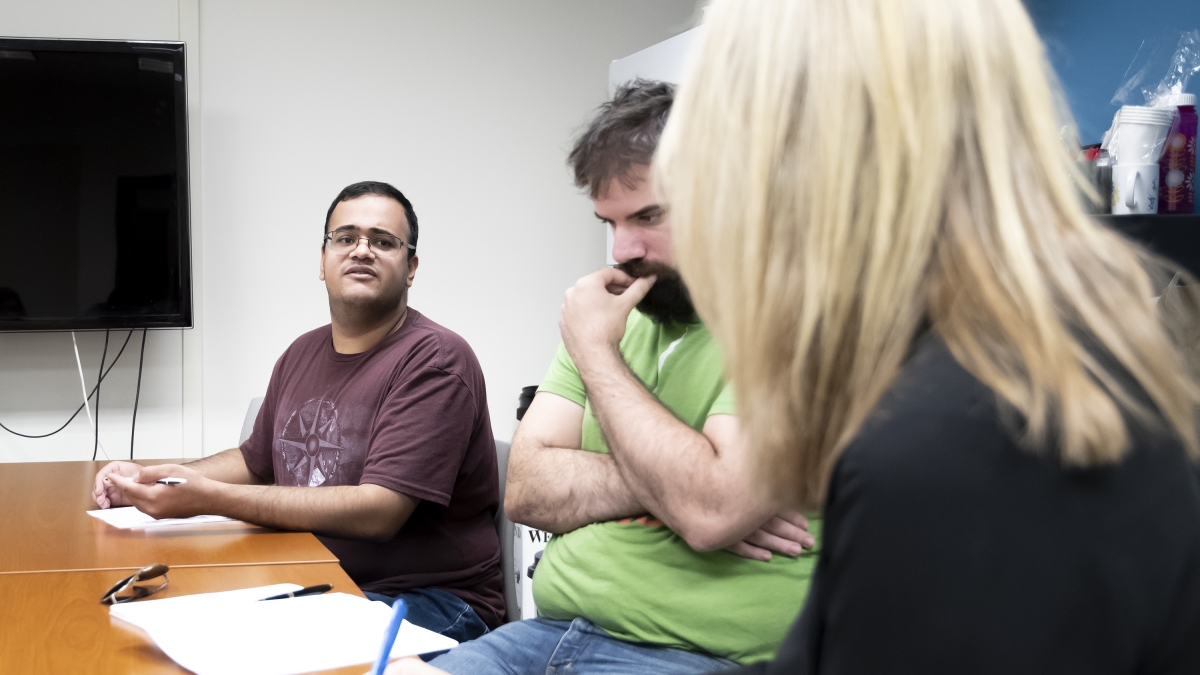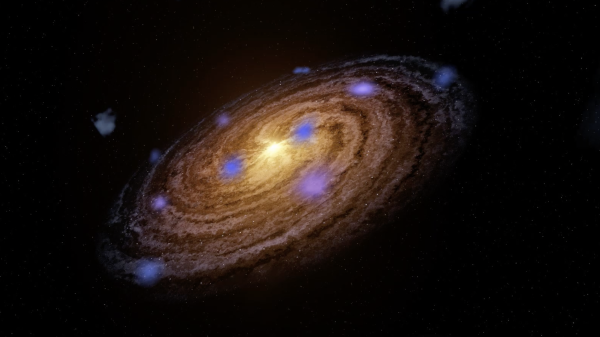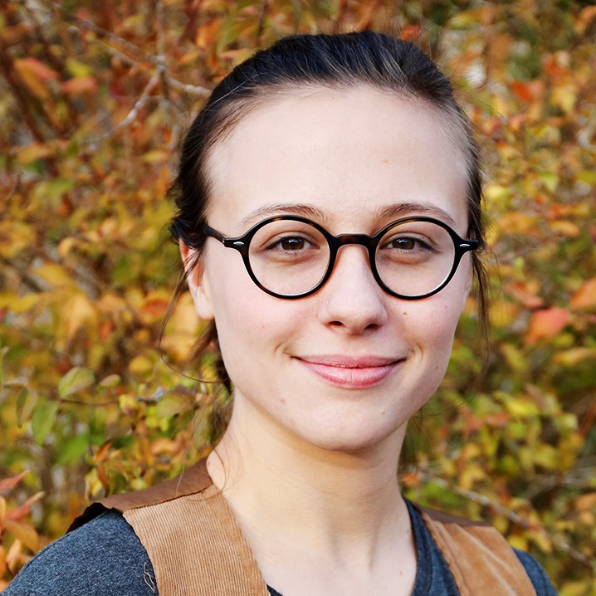ASU graduate students explore careers through The College Ambassadors program

Zain Bukhari, a doctoral student at The College's School of Life Sciences, speaks to Linda Raish during a meeting for The College Ambassadors this summer.
From nonprofit and industry work to professorships and research, forging a career after graduate school isn’t always straightforward.
A mentorship and networking initiative in The College of Liberal Arts and Sciences is helping students clarify their path — by connecting them with Arizona State University alumni who’ve already been through the process.
Launched in 2016 in The College’s School of Life Sciences, The College Ambassadors program includes graduate students from across the natural science, social science and humanities divisions.
Students selected for the program spend the summer serving as representatives for their schools and departments, reaching out to alumni to discuss research and future opportunities.
Susanne Neuer is a professor in the School of Life Sciences who spearheaded the initial program there. It expanded to other units with the help of the Graduate and Professional Student Association at ASU and The College’s development team.
She said ambassadors are matched with alumni whose research and career trajectories match their interests. Students get firsthand insight into how their degrees apply to the real world, while industry leaders get an in depth look at the The College’s graduate programs and the talent being fostered within them.
“By speaking with alumni who are focused on similar research or are in a career that the student is interested in pursuing after graduation, the range of opportunities for their own careers become clearer,” Neuer said. "Graduate students are also often busy during the school year — having this paid opportunity during the summer months allows them to stay engaged with The College, while also being supported financially.”
Meaningful networking
Advanced degrees sometimes pave the way for careers in academia. But the research students produce in their programs also has applications beyond the classroom.
Madeline Kelley is a doctoral candidate in geography at The College’s School of Geographical Sciences and Urban Planning. She participated in the program this summer while completing research at NASA’s John C. Stennis Space Center in Mississippi. She worked in the naval research lab exploring how turbulent water impacts the movement of minerals and other sediments in oceans. The position was one of several state and federal research initiatives she’s taken part in while a student.
School of Geographical Sciences and Urban Planning doctoral student Madeline Kelley
She said the ambassador program was also a chance to navigate the challenges of careers in science, technology, engineering and math fields.
“I've done other mentorship programs in the past, but The College Ambassadors program was unique because it focused on other people from Arizona State University who had different experiences and also very different career tracks,” she said. “The program also connected me with other female researchers who could talk about the hurdles they’ve encountered being a woman in STEM — that helped me feel more prepared for my own.”
Real-world solutions
In the past, graduate students from arts and science disciplines might have expected to go into professorships or continue in academia. But Linda Raish, director of development for the natural science division of The College, said that’s changing.
“Only about 16% of our graduate students at the School of Life Sciences know they would like to go into academia, 84% are considering going into something else — that statistic is similar across the natural sciences,” she said. “We found that ASU’s research capacity and faculty caliber was giving our graduate students great preparation and insight into academia, but they also needed the insight of people working in industry research and development positions in private and public sectors.”
That was the case for Zain Bukhari, a student pursuing a PhD in molecular and cellular biology in the School of Life Sciences. His research focuses on the analysis of an energy-storing enzyme called the ATP synthase and its potential use as a treatment aid in a number of diseases.
As part of the The College Ambassadors summer program, Bukhari spoke with alumni he said helped clarify what could come next for his own work.
“I asked to be connected to some industry professionals because I already have a lot of very good academic connections here at The College and I'm not entirely sure whether I’ll take an industry or academic path after graduation,” he said. “I think especially in our field, there’s a big push to put scientific concepts and research toward finding real-world solutions — I talked to alumni doing both academia and industry work who had a lot of insight into how to do that.”
Evolving career paths and opportunities
Raish said industry leaders are also engaging with the university in other ways as the ambassador program continues to gain ground. Twenty graduate students from eight different units of The College took part this summer and reached out to over 300 alumni, up by over 20% from 2018.
Daniel Kolk, an ASU alumnus who earned his doctoral degree in molecular genetics from The College in 1992, has advised graduate students with The College Ambassadors program in the past. From pharmaceuticals to plant-based protein, he said today’s graduates have expanding career options as technology and science become increasingly present in our everyday lives.
“At least four major branches of biotechnology are fields available to any science major,” he said. “A lot of people don’t realize that things like the Impossible Burger are the products of scientific research — that plant-based product in particular was created by a microbiologist.”
Kolk, who now works as the vice president of clinical development at Utah-based diagnostic device firm XCR Diagnostics, said despite the growing industry demand for biotechnology experts, many major research universities still expect graduates to continue into professorships or institutional research. He said he sees The College Ambassadors program as one way ASU is helping to change that.
The program expanded further when he, Raish and faculty leaders at The College formed the ASU Biotechnology Advisory Board last September. Now a year old, the board includes Kolk and 25 other industry professionals who monitor the evolution of bioscience research at ASU and connect with current graduate students. Raish said the concept could one day expand to other divisions at The College.
For Kolk, participating in the board is another way to help students understand how fields are evolving and how they can continue to innovate within them.
“There's literally dozens of different types of jobs in diagnostic, pharmaceutical, agriculture and food science companies that students aren't always being made aware of,” he said. “I try to educate faculty and students on this whole other realm of opportunity that didn’t exist in the same way a few decades ago, but can lead to a rewarding industry career today.”
More Science and technology

Cosmic clues: Metal-poor regions unveil potential method for galaxy growth
For decades, astronomers have analyzed data from space and ground telescopes to learn more about galaxies in the universe.…

Indigenous geneticists build unprecedented research community at ASU
When Krystal Tsosie (Diné) was an undergraduate at Arizona State University, there were no Indigenous faculty she could look to…

Pioneering professor of cultural evolution pens essays for leading academic journals
When Robert Boyd wrote his 1985 book “Culture and the Evolutionary Process,” cultural evolution was not considered a true…
